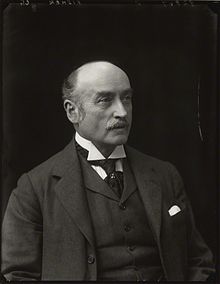William Hayes Fisher, 1st Baron Downham
|
The Right Honourable The Lord Downham PC KStJ |
|
|---|---|
 |
|
| President of the Local Government Board | |
|
In office 28 June 1917 – 4 November 1918 |
|
| Monarch | George V |
| Prime Minister |
H. H. Asquith David Lloyd George |
| Preceded by | Walter Long |
| Succeeded by | Auckland Geddes |
| Chancellor of the Duchy of Lancaster | |
|
In office 4 November 1918 – 10 January 1919 |
|
| Monarch | George V |
| Prime Minister | David Lloyd George |
| Preceded by | The Lord Beaverbrook |
| Succeeded by | The Earl of Crawford |
| Minister of Information | |
|
In office 4 November 1918 – 10 January 1919 |
|
| Monarch | George V |
| Prime Minister | David Lloyd George |
| Preceded by | The Lord Beaverbrook |
| Succeeded by | Office abolished |
| Personal details | |
| Born |
18 March 1853 Downham, Isle of Ely. Cambridgeshire |
| Died |
2 July 1920 (aged 67) Buckingham Palace Garden, London |
| Nationality | British |
| Political party | Conservative |
| Spouse(s) | Florence Fisher (d. 1923) |
| Alma mater | University College, Oxford |
William Hayes Fisher, 1st Baron Downham PC, KStJ (1853 – 2 July 1920), was a British Conservative Party politician. He held office as President of the Local Government Board and Minister of Information in David Lloyd George's First World War coalition government.
Born at Downham, (known now as 'Little Downham') in the Isle of Ely, Cambridgeshire, Fisher was the son of Reverend Frederick Fisher, rector of that parish, and Mary, daughter of William Hayes. He was educated at Haileybury and University College, Oxford, and was called to the Bar, Inner Temple, in 1879.
Fisher was elected to the House of Commons for Fulham in 1885, a seat he held until 1906. He was private secretary Sir Michael Hicks Beach between 1886 and 1887 and to Arthur Balfour between 1887 and 1892 (who both served as Chief Secretary for Ireland at the time). In 1896 he was appointed a Junior Lord of the Treasury (government whip) in the Conservative administration of Lord Salisbury, a post he held until August 1902, and then served under Arthur Balfour as Financial Secretary to the Treasury from 11 August 1902 to April 1903, when he resigned as a result of his connection with a financial syndicate. He lost his Fulham seat at the 1906 general election but successfully reclaimed it at the January 1910 general election. The following year he was sworn of the Privy Council.
...
Wikipedia
